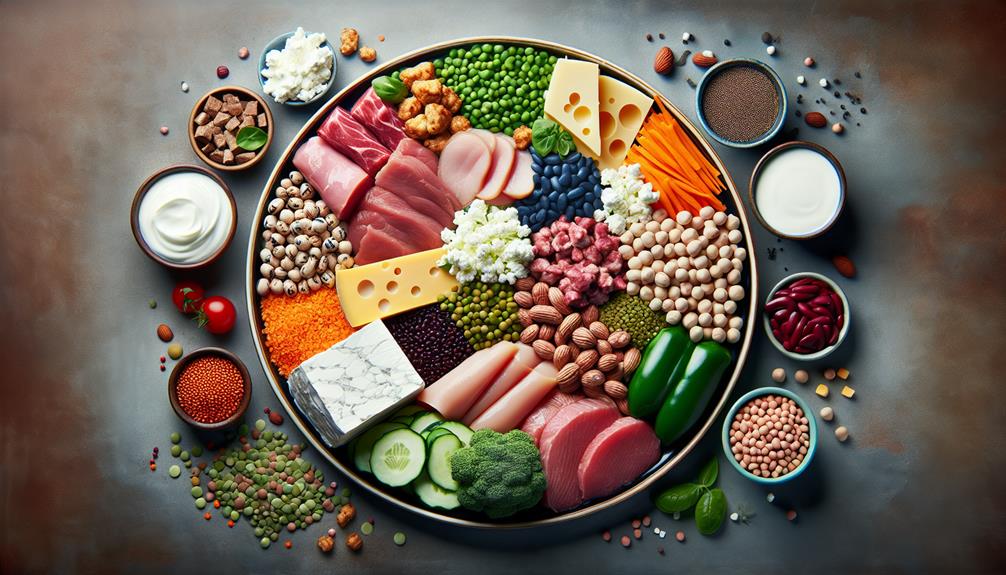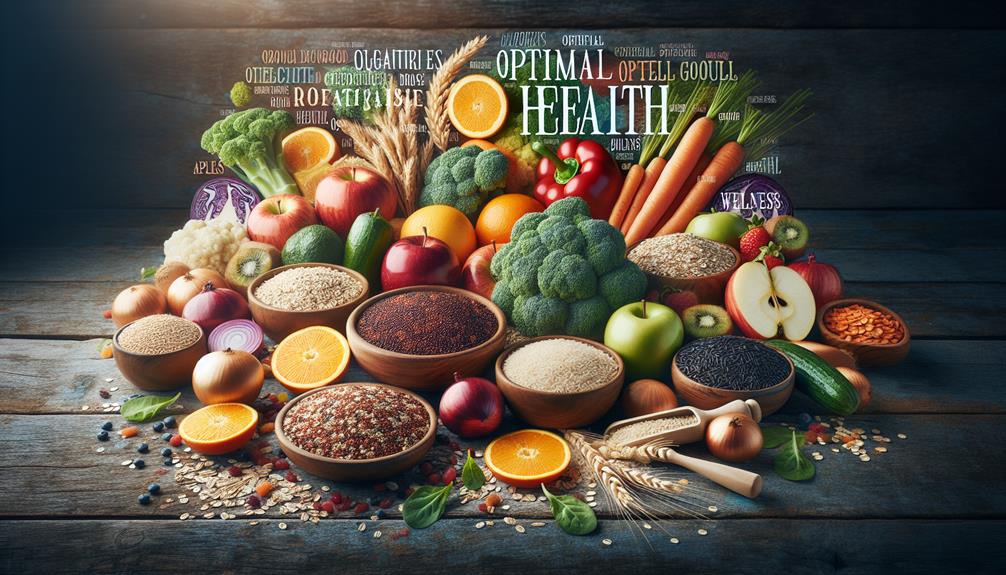To achieve optimal health and wellness, you must prioritize balanced nutrition. It is not just about counting calories or following the latest fad diet – it is about nourishing your body with the right combination of nutrients. In this discussion, we will explore the basics of balanced nutrition, the role of macronutrients and micronutrients, the importance of protein and healthy fats, the benefits of incorporating whole grains, and the power of fruits and vegetables. But there is one key element that ties it all together, and you won't want to miss it.
Key Takeaways
- Understanding portion control and choosing whole, unprocessed foods are important for balanced nutrition.
- Macronutrients like carbohydrates, proteins, and fats provide energy and support bodily functions, while vitamins and minerals are crucial micronutrients.
- Protein supports growth, repair, and maintenance of tissues, and incorporating a variety of protein sources ensures adequate amino acid intake.
- Healthy fats and oils are essential for overall body functioning, brain health, and hormone production. Incorporating whole grains into your diet can provide nutrients and fiber, reducing the risk of chronic diseases.
The Basics of Balanced Nutrition
To achieve optimal health, it is crucial to understand the basics of balanced nutrition and make informed choices about what you eat. One key aspect of balanced nutrition is understanding portion control. Portion control refers to the amount of food you consume in one sitting. It is important because consuming excessive portions can lead to weight gain and other health issues. By practicing portion control, you can ensure that you are eating the right amount of nutrients your body needs without overindulging.
Another important factor to consider in balanced nutrition is the impact of processed foods. Processed foods are often high in added sugars, unhealthy fats, and sodium. These ingredients can have negative effects on your health, such as increased risk of obesity, heart disease, and diabetes. It is essential to limit your consumption of processed foods and instead opt for whole, unprocessed foods like fruits, vegetables, lean proteins, and whole grains.
Understanding Macronutrients and Micronutrients
Understanding the role of macronutrients and micronutrients is essential for achieving balanced nutrition and optimizing your health. Macronutrients are the nutrients that your body needs in larger amounts, such as carbohydrates, proteins, and fats. These nutrients provide energy, support growth and repair, and help regulate bodily functions. Micronutrients, on the other hand, are the vitamins and minerals that your body needs in smaller amounts. While they may be required in smaller quantities, they play crucial roles in various bodily functions, including immune function, energy production, and bone health.
Here are three key points to emphasize the importance of macronutrients and micronutrients in your diet:
- Macronutrients, such as carbohydrates, proteins, and fats, provide the energy your body needs to function properly. They also play a role in maintaining healthy body weight and muscle mass.
- Micronutrients, including vitamins and minerals, are essential for numerous bodily functions, such as supporting the immune system, aiding in the production of enzymes and hormones, and promoting healthy skin and hair.
- Portion control is vital in maintaining a balanced diet. While macronutrients and micronutrients are important, consuming them in appropriate portions is crucial to avoid overeating and ensure that your body receives the nutrients it needs without excess calories.
The Role of Protein in a Balanced Diet

Protein plays a vital role in a balanced diet, supporting various bodily functions and promoting optimal health. It is an essential macronutrient that is involved in the growth, repair, and maintenance of tissues in the body. Meeting your protein requirements is crucial for overall well-being.
When it comes to protein sources, there are numerous options available. Animal-based sources such as meat, poultry, fish, eggs, and dairy products are complete proteins, meaning they contain all the essential amino acids that your body needs. Plant-based sources like legumes, nuts, seeds, and grains are also rich in protein, but they may lack certain amino acids. Combining different plant-based protein sources can help ensure you obtain all the essential amino acids.
The amount of protein you need depends on various factors, including your age, sex, weight, and activity level. Generally, it is recommended that adults consume about 0.8 grams of protein per kilogram of body weight per day. However, athletes, pregnant or breastfeeding women, and individuals recovering from injuries may have higher protein requirements.
Including protein-rich foods in your diet is essential for maintaining muscle mass, supporting immune function, and promoting satiety. Make sure to choose a variety of protein sources and adjust your intake based on your individual needs. By doing so, you can ensure that your body receives adequate protein for optimal health and wellness.
The Importance of Healthy Fats and Oils
Are you aware of the significant role that healthy fats and oils play in maintaining optimal health? While fats and oils have long been demonized as the culprits behind weight gain and various health issues, it is important to understand that not all fats are created equal. In fact, incorporating healthy fats and oils into your diet can actually promote weight loss and support overall well-being.
Here are three key reasons why healthy fats and oils are essential for your health:
- Healthy fats and weight loss: Contrary to popular belief, consuming healthy fats can actually aid in weight loss. Healthy fats, such as monounsaturated fats found in avocados and olive oil, can help you feel satiated and satisfied, reducing the likelihood of overeating. Additionally, these fats can boost your metabolism, allowing your body to efficiently burn calories.
- Different types of healthy oils: When it comes to healthy oils, there is a wide variety to choose from. Some examples include extra virgin olive oil, coconut oil, and flaxseed oil. Each type of oil offers its own unique health benefits, from reducing inflammation to supporting heart health. Incorporating a variety of healthy oils into your diet ensures that you are getting a range of essential nutrients and fatty acids.
- Supporting overall health and wellness: Healthy fats and oils are vital for the proper functioning of your body. They provide insulation for your organs, help absorb certain vitamins, and contribute to healthy cell function. Additionally, they play a crucial role in brain health and the production of hormones.
Incorporating Whole Grains for Optimal Health

To optimize your health, incorporating whole grains into your diet is essential. Whole grains are packed with nutrients and fiber that can contribute to overall wellness. One of the key benefits of fiber in whole grains is its ability to support digestive health. Fiber helps to regulate bowel movements, prevent constipation, and promote a healthy gut microbiome. Additionally, consuming fiber-rich whole grains has been linked to a reduced risk of heart disease, stroke, and type 2 diabetes.
Incorporating whole grains into your meals doesn't have to be boring or tasteless. There are plenty of delicious whole grain recipes that can satisfy your taste buds while providing numerous health benefits. For breakfast, try oatmeal topped with fresh berries and a sprinkle of chia seeds. For lunch, opt for a quinoa salad with mixed vegetables and a lemon vinaigrette dressing. And for dinner, consider replacing refined grains with brown rice or whole wheat pasta in your favorite dishes.
The Power of Fruits and Vegetables in Your Diet
Incorporating a variety of fruits and vegetables into your diet is crucial for maintaining optimal health and well-being. These natural powerhouses provide essential nutrients, vitamins, minerals, and antioxidants that support your body's functions and help prevent chronic diseases. Here are three creative ways to incorporate fruits and vegetables into your daily meals:
- Juicing: Juicing is an excellent way to maximize the benefits of fruits and vegetables. By extracting the juice from fresh produce, you can easily consume a concentrated dose of vitamins and minerals. Additionally, juicing allows you to mix different fruits and vegetables to create delicious and nutritious combinations.
- Smoothies: Smoothies are a convenient and tasty option to incorporate fruits and vegetables into your diet. Blend a variety of colorful fruits and leafy greens with yogurt or milk for a refreshing and nutrient-packed beverage. You can also add nuts or seeds for an extra boost of protein and healthy fats.
- Veggie-based meals: Get creative with your meals by substituting traditional grains or proteins with vegetables. For example, you can make zucchini noodles instead of regular pasta or use cauliflower rice instead of white rice. These alternatives not only enhance your nutrient intake but also add vibrant flavors and textures to your dishes.
Hydration: The Key to a Balanced Body

Staying properly hydrated is essential for maintaining a balanced body and optimizing your overall health and well-being. Water is a vital nutrient that plays a crucial role in almost every bodily function. It is important to understand the importance of water intake and the benefits of staying hydrated throughout the day.
Water is involved in the digestion and absorption of food, the regulation of body temperature, the lubrication of joints, and the transportation of nutrients and oxygen to cells. It also helps to flush out toxins, supports healthy kidney function, and promotes healthy skin.
Dehydration can lead to a range of health issues, including fatigue, headaches, dizziness, and constipation. It can also impair cognitive function and mood. Therefore, it is important to drink water regularly throughout the day to maintain proper hydration levels.
The benefits of staying hydrated are numerous. Drinking an adequate amount of water can boost your energy levels, improve your mental clarity and focus, and enhance physical performance. It can also help with weight management by reducing hunger and promoting a feeling of fullness. Additionally, staying hydrated can support healthy skin, prevent muscle cramps, and aid in digestion.
To ensure that you stay properly hydrated, it is recommended to drink at least 8 cups (64 ounces) of water per day. However, individual needs may vary based on factors such as age, activity level, and climate. Remember to listen to your body's thirst signals and drink water throughout the day to maintain optimal hydration and promote a balanced body.
Frequently Asked Questions
How Many Calories Should I Consume in a Day to Maintain a Balanced Diet?
To maintain a balanced diet, you should consider your caloric intake. The amount of calories you need to consume in a day depends on factors like age, weight, and activity level.
Are Artificial Sweeteners a Healthy Alternative to Sugar?
Artificial sweeteners are commonly used as sugar alternatives, but they come with potential health risks. Studies suggest they may disrupt gut bacteria, increase cravings, and contribute to weight gain. Moderation is key.
Can Supplements Replace the Need for a Well-Balanced Diet?
Supplements can't replace a well-balanced diet. Your body absorbs nutrients better from whole foods. Plus, here's an emotional statistic: people who rely solely on supplements have a 30% higher risk of nutrient deficiencies.
What Are Some Tips for Portion Control to Maintain a Balanced Diet?
To maintain a balanced diet, focus on portion control and practice mindful eating. Be aware of serving sizes, use smaller plates, and listen to your body's hunger and fullness cues.
Is It Necessary to Count Macronutrients and Track Food Intake to Achieve Optimal Health and Wellness?
To achieve optimal health and wellness, it's not necessary to count macronutrients or track food intake. Instead, focus on intuitive eating and listen to your body's signals. Regular exercise also plays a crucial role in maintaining overall well-being.
Conclusion
So, when it comes to achieving optimal health and wellness, balanced nutrition is key. By understanding the basics of balanced nutrition, incorporating a variety of macronutrients and micronutrients, and making healthy food choices, we can fuel our bodies with the nutrients they need to thrive. So, why settle for anything less than the best for your body? Start nourishing yourself with a balanced diet today and experience the amazing benefits it can bring. After all, isn't your health worth it?














